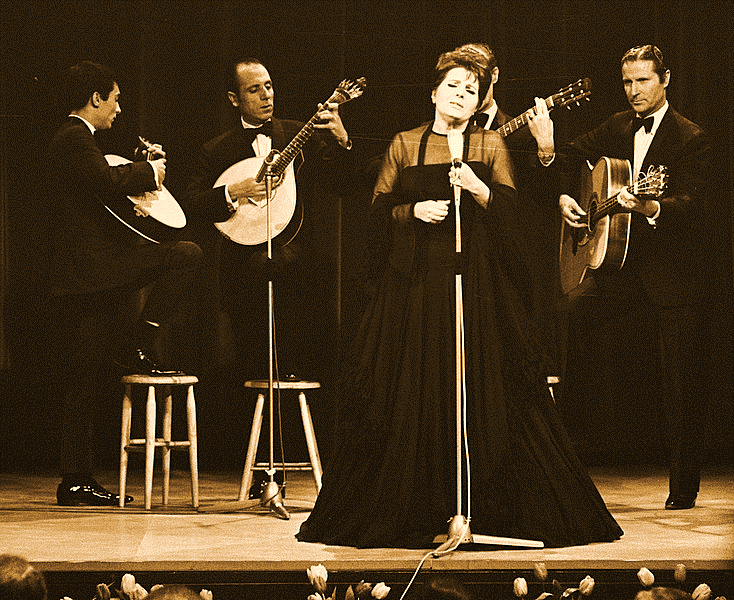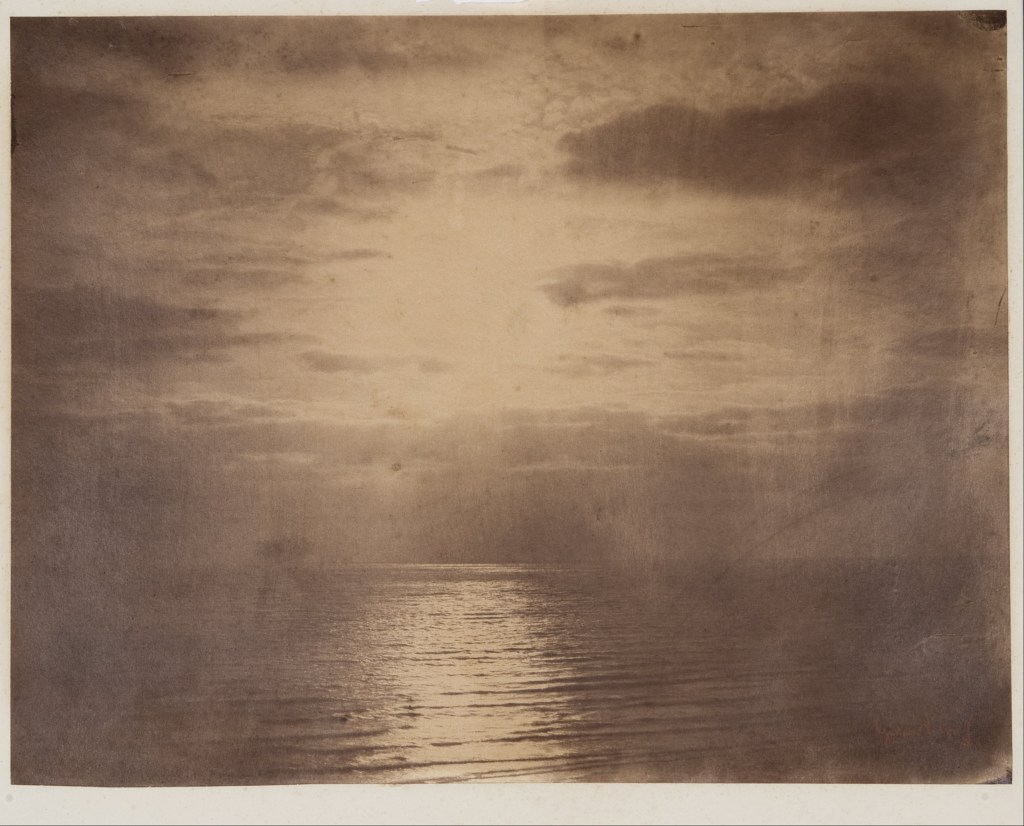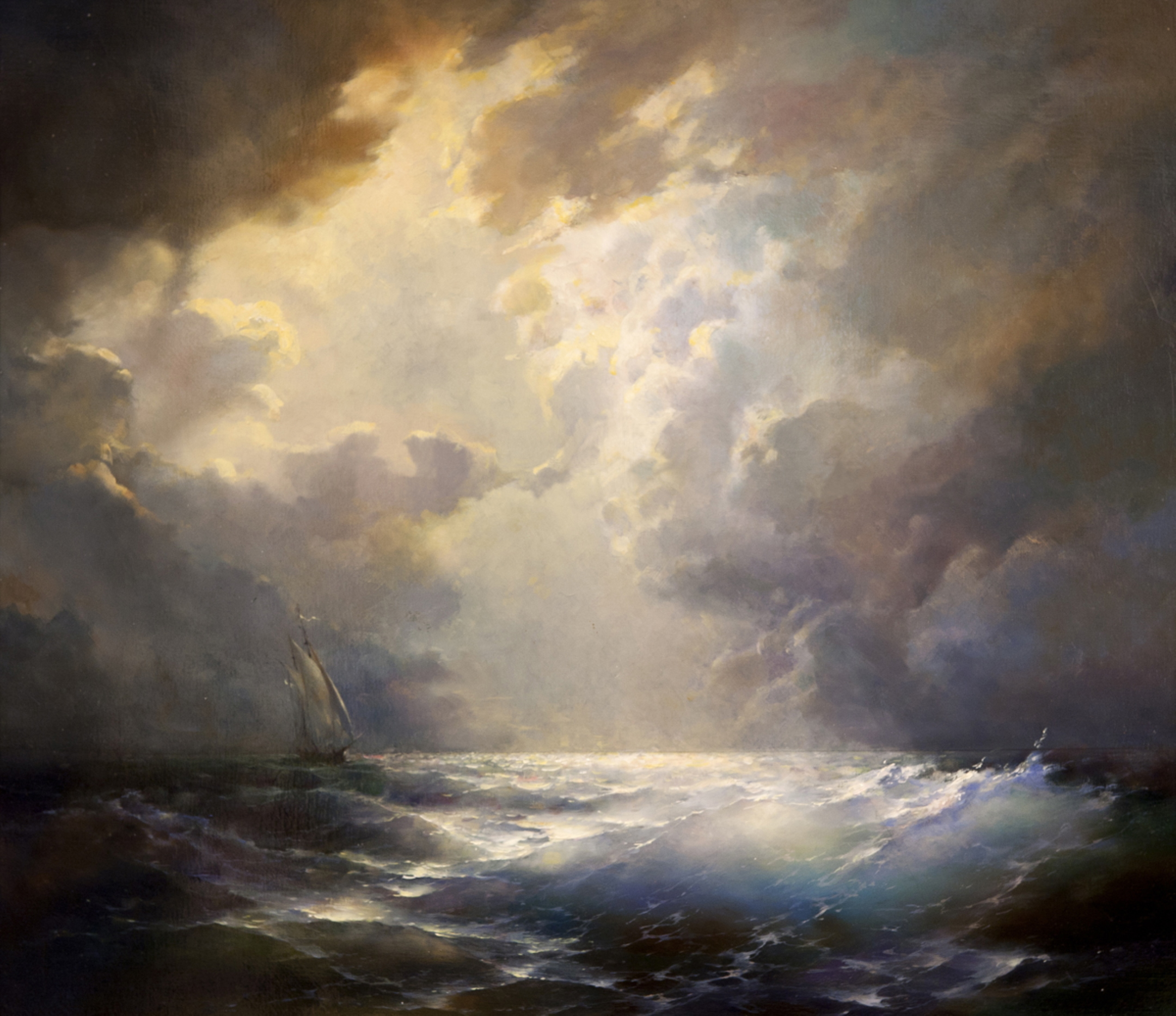José Regio / Amália Rodrigues: Fado Português
Das Meer spielt in vielen Fados eine zentrale Rolle. Zuweilen wird es sogar – wie in dem berühmten Fado Português des portugiesischen Autors José Regio – alsWiege des Fados besungen.
The sea plays a central role in many fados. Sometimes it is even referred to as the cradle of fado, as in the famous Fado Português by the Portuguese author José Regio.
Fado Português
Der Fado wurde auf einem Schiff geboren,
eines Tages, als der Himmel gähnte
über dem weiten, unbewegten Meer
und kein Windhauch flüsternd
die Segellungen blähte.
Da ergoss die Sehnsucht eines Seemanns,
sein flehender Blick auf das schweigende Meer,
sich in ein Lied.
„Ach, wie ich mich sehne
nach der Schönheit meiner Erde,
meiner Hügel, meiner Täler,
nach Blättern, Blumen und dem Gold
der reifen Früchte!
In dem Schleier meiner Tränen
spiegeln sich die spanischen Lande
und der warme Strand der Heimat.“
Während die Klänge des Liedes verebben
auf den zerbrechlichen Planken des Schiffs,
zittert die Luft von dem Stachel der Wünsche,
und auf den Lippen des träumenden Seemanns
brennt die sengende See wie ein Kuss.
„Adieu, liebste Mutter, adieu, Maria!
Möge dein Herz den Schwur bewahren,
den der Wind mit diesem Lied dir bringt:
Mein Leben liegt in Gottes Hand.
Ich beuge mich vor ihm,
legt er mich in dies feuchte Grab.
Falls nicht, so führe ich dich zum Altar!“
Von da an lebte der Fado fort
in der Sehnsucht der Matrosen.
Wann immer der Himmel gähnte
über dem weiten, unbewegten Meer
und kein Windhauch flüsternd
die Segellungen blähte,
ergoss sich ihre Sehnsucht in ein Lied.
José Regio: Fado Português
Musik: Alain Oulman
Interpretin: Amália Rodrigues
Titelsong des Albums Fado Português (1965)
Live-Aufnahme:
Studioaufnahme mit Bildern der Sängerin:
Portugal: ein Kind des Meeres
Kein Zweifel: Das Leben portugiesischer Menschen ist vom Meer geprägt. Dies bezieht sich keineswegs nur auf das Klima, das überall in Portugal vom Meer beeinflusst ist. Auch für die portugiesische Wirtschaft und Geschichte war und ist die Nähe zum Meer von entscheidender Bedeutung.
So war das Meer die Voraussetzung für den Aufstieg Portugals zu einer Weltmacht. Es erinnert heute aber nicht nur an die glorreiche Vergangenheit Portugals als Seefahrernation. Vielmehr spiegeln sich in ihm auch die Auswanderungswellen wider, zu denen es seit dem 19. Jahrhundert infolge der sozioökonomischen Strukturveränderungen immer wieder gekommen ist.
Das Meer steht damit hier gleichermaßen für Verheißung und Verderben. Einerseits verspricht sein freier Horizont einen Neuanfang jenseits der engen Grenzen des gegenwärtigen Alltags, ein neues Leben in einem leuchtenden Irgendwo. Andererseits wissen diejenigen, die von einem solchen Neuanfang träumen, auch von dem Verderben, das der Sprung in den Schoß des Meeres so vielen Träumenden vor ihnen gebracht hat.
Das Meer als Allegorie des Lebens
Daneben hängt das Überleben in einem Küstenland natürlich auch vom Rhythmus der Gezeiten, möglichen Sturmfluten und den „Früchten des Meeres“, also dem Fischfang ab. Eine so existenzielle Bedeutung des Meeres legt nahe, in diesem auch allgemein eine Allegorie des Lebens zu sehen.
Das Meer steht dabei für den Zauber des Neuanfangs, die Verheißung des unbefleckten Horizonts, in das jedes neue Leben sich einschreiben kann. Gleichzeitig spiegelt sich in ihm aber auch der Untergang wider, der jedem neuen Leben unaufhebbar innewohnt.
So verwundert es nicht, dass auch der Fado, diese portugiesischste aller Gesangsformen, vielfach in enger Beziehung zum Meer gesehen wird. Denn „Fado“ leitet sich ab von „fatum“, dem lateinischen Wort für „Schicksal“. Auch im Portugiesischen bedeutet „fado“ zugleich „Schicksal“.
Der Fado als Ausdruck der Saudade
Wie manche Musikwissenschaftler den Ursprung des Fados in der Gesangskultur der portugiesischen Seeleute vermuten, wird auch in einem der berühmtesten Fados, dem Fado Português, der Fado auf den spontanen Ausdruckswillen eines Seemanns zurückgeführt.
Dabei wird zugleich der enge Zusammenhang zwischen Fado und Saudade deutlich, einem Lebensgefühl, das sich aus der Sehnsucht nach dem Unerreichbaren speist, bei gleichzeitigem Bewusstsein von der Unerfüllbarkeit dieser Sehnsucht.
Die Saudade kann sich damit ganz allgemein auf die unbestimmte Sehnsucht nach einem vollkommenen, ungetrübten Glück beziehen, als Kontrast zum unerfüllten Zustand der Gegenwart. Meist wird diese Sehnsucht allerdings in ein bestimmtes Gewand gekleidet – etwa in das Gewand einer idealisierten (persönlichen oder historischen) Vergangenheit, in das Gewand einer verlorenen Liebe oder in das Gewand eines fernen, unbekannten Landes, in dem jeder Traum ein Zuhause findet.
Doppelte Trostfunktion des Fados
Der Fado erfüllt in dem Zusammenhang zum einen die Funktion, den Schmerz über die unerfüllbare Sehnsucht zum Ausdruck zu bringen. Zum anderen dient er jedoch – als paradoxe Gegenbewegung hierzu – auch dazu, das scheinbar Unerfüllbare im Moment des Singens als traumhafte Wirklichkeit erfahrbar zu machen.
So ermöglicht der Schleier der Tränen dem Seemann im Fado Português eine andere Sicht auf die Welt. Er blickt auf ein Land, in dem den Menschen goldene Früchte in den Schoß fallen, und die Luft, die er küsst, fühlt sich auf einmal weich an wie die Lippen der Geliebten.
Damit kommt dem Fado hier eine doppelte Trostfunktion zu: Er erleichtert die Seele, indem er eine Ausdrucksmöglichkeit und damit ein Ventil für den Schmerz bereitstellt. Gleichzeitig bekräftigt er aber auch das Recht und die Wirklichkeit des Traums gegenüber der Realität des unerfüllten Alltagslebens.
Über José Regio und Alain Oulman
José Regio (1901 – 1969) zählt zu den bedeutendsten portugiesischen Autoren des 20. Jahrhunderts. Im Brotberuf Gymnasiallehrer, schrieb er sowohl Gedichte als auch Romane, Essays und Dramen. Aufgrund seiner kritischen Haltung gegenüber der Salazar-Diktatur durfte ein Teil seines Werkes in Portugal zeitweilig nicht erscheinen. Dennoch sind viele seiner Romane verfilmt worden.
Alain Oulman (1928 – 1990) hat zu vielen heute legendären Fados die Musik komponiert. Besonders intensiv war seine Zusammenarbeit mit Amália Rodrigues, für die er neben dem Fado Português noch weitere Texte vertont hat. Oulman entstammte einer jüdisch-französischen Familie, wuchs aber in Portugal auf. Aufgrund von Konflikten mit dem Salazar-Regime ging er 1965 ins Exil und nahm in Paris eine verlegerische Tätigkeit auf.
Über Amália Rodrigues

Amália Rodrigues (1920 – 1999) wird in Portugal mit dem Beinamen „Rainha do Fado“ (Königin des Fados) geehrt. Sie hat den Fado nicht nur in Portugal geprägt, sondern ihn auch auf zahlreichen Tourneen international bekannt gemacht.
Wie sehr sie in Portugal verehrt wird, zeigt sich auch daran, dass bei ihrem Tod eine dreitägige Staatstrauer ausgerufen und der damalige Wahlkampf vorübergehend eingestellt wurde. Bei einem Trauermarsch erwiesen unzählige Menschen der Sängerin die letzte Ehre. Zwei Jahre nach ihrem Tod wurden ihre sterblichen Überreste in das Nationalheiligtum Portugals in der Lissabonner Kathedrale Santa Egrácia umgebettet.
Das hohe Ansehen der Sängerin erklärt sich zunächst damit, dass sie als Interpretin zahlreicher bedeutender Fados gewissermaßen als Verkörperung des Fados gelten kann. Die Trauer um sie galt damit wohl auch dem Fado selbst.
Darüber hinaus steht auch die Biographie von Amália Rodrigues in vielen Aspekten exemplarisch für Kultur und Geschichte des Fados. So wuchs die Sängerin, die auch als Schauspielerin in mehreren Filmen aufgetreten ist, bei ihren Großeltern auf, weil ihr Vater – ein Schuhmacher – seine neun Kinder mit seiner Arbeit nicht ernähren konnte. Vier ihrer Geschwister starben im Kleinkindalter, sie selbst musste schon früh durch einfache Arbeiten zum Familieneinkommen beitragen. Sie tröstete sich mit ihrem Gesang, konnte anfangs aber nur in Nachtclubs und Bars auftreten.
Auch das ambivalente Verhältnis der Salazar-Diktatur zu der Sängerin ist charakteristisch für den Fado. Einerseits versuchte das Regime, sich im zunehmenden Ruhm von Rodrigues zu sonnen und sie als Aushängeschild Portugals für sich zu vereinnahmen. Andererseits war aber auch Rodrigues von Verboten betroffen, wenn sie Fados mit kritischen Untertönen sang.
Den größten internationalen Erfolg hatte Amália Rodrigues mit dem Fado Coimbra, der in der französischen Fassung – mit dem Titel Avril au Portugal (April in Portugal) – ein Welterfolg wurde und unzählige Male gecovert worden ist.
Weitere Beiträge zum Themenkomplex Portugal und das Meer
Galicien und Portugal: Lieder über die Auswanderung
Die Wüste Gottes (zu Madredeus: O Mar / Das Meer)
José (Zeca) Afonso: Canção do Desterro (Emigrantes) / Lied vom Exil. Ein portugiesisches Lied über die Migration
Wellenritt ins Ungewisse (zu Ornatos Violeta: Capitão Romance / Kapitänsromanze; Beitrag geht auch auf den Zusammenhang zwischen romantischem Weltschmerz und portugiesischer Saudade ein)

English Version
The Fado and the Sea
José Regio / Amália Rodrigues: Fado Português
Fado Português
The fado was born on a ship,
on a day when the abyss of the yawning sky
gaped over the vast, motionless sea
and not the slightest breeze
whispered in the lungs of the ship.
Then a sailor filled his longing
and his pleading gaze on the silent sea
into a song.
„Oh, how I long
for the beauty of my land,
for my hills, my valleys,
leaves and flowers and the gold
of the ripened fruits!
In the veil of my tears
the Spanish lands are reflected
and the gentle beach of home.“
As the sounds of the song fade away
on the fragile planks of the ship,
the air trembles with the sting of desire,
and on the lips of the dreaming sailor
the scorching sea burns like a kiss.
„Farewell, dearest Mother, farewell, Mary!
May your heart keep the vow
that the wind shall bring you with this song:
My life is in God’s hand.
I shall submit to his will,
if he lays me in this humid grave.
If not, I will take you to the altar!“
From then on, the fado lived on
in the longing of the sailors.
Whenever the abyss of the yawning sky
gaped over the vast, motionless sea
and not the slightest breeze
whispered in the lungs of the ship,
their longing turned into a song.
José Regio: Fado Português
Composer: Alain Oulman
Singer: Amália Rodrigues
Title track of the album Fado Português (1965)
Studio recording with pictures of the singer
Portugal: a Child of the Sea
There is no doubt about it: Life in Portugal is shaped by the sea. This does not only refer to the climate, which is influenced by the sea everywhere in Portugal. The proximity to the sea was and is also of decisive importance for the Portuguese economy and history.
The sea was the prerequisite for the rise of Portugal to a world power. Today, however, it not only recalls Portugal’s glorious past as a seafaring nation. It also reflects the waves of emigration that have occurred repeatedly since the 19th century due to socio-economic transformations.
The sea therefore represents both promise and doom here. On the one hand, its free horizon promises a new beginning beyond the narrow confines of daily life, a new existence in a bright Nowhereland. On the other hand, those who dream of such a new beginning also know of the doom that the leap into the bosom of the sea has brought to so many dreamers before them.
The Sea as an Allegory of Life
In addition, survival in a coastal country naturally depends on the rhythm of the tides, possible storm surges and the „fruits of the sea“, i.e. the fishing grounds. Given this existential significance of the sea, it is sometimes even seen as an allegory of life.
Thus, on the one hand, the sea stands for the magic of a new beginning, the promise of the immaculate horizon in which every new life can inscribe itself. At the same time, however, it also reflects the downfall that is irrevocably inherent in every new life.
It is therefore not surprising that the fado, the most Portuguese of all forms of singing, is often seen in close relation to the sea. After all, „fado“ is derived from „fatum“, the Latin word for „fate“. Similarly, „fado“ also means „fate“ in Portuguese.
The Fado as an Expression of the Saudade
Just as some musicologists assume the origin of fado in the singing culture of Portuguese sailors, this special singing culture is also traced back to the spontaneous will of a sailor to express himself in one of the most famous fados, the Fado Português.
At the same time, this points to the close connection between fado and saudade, an attitude to life based on the longing for the unattainable, while at the same time being aware of the unattainability of this longing.
The saudade can thus refer quite generally to the vague longing for a perfect, indestructible happiness, as a contrast to the unfulfilled state of the present. Usually, however, this longing appears in a certain guise – for example, in the guise of an idealised (personal or historical) past, in the guise of a lost love or in the guise of a distant, unknown country where every dream finds a home.
Twofold Consolation Function of the Fado
On the one hand, the fado therefore serves the function of expressing the pain of unfulfillable longing. On the other hand, however, it also helps – as a paradoxical countermovement to this – to make the seemingly unfulfillable tangible as a dreamlike reality at the moment of singing.
Consequently, in the Fado Português, the veil of tears enables the sailor to see the world differently. Suddenly he looks out on a land where golden fruits fall into people’s laps, and the air he kisses feels soft like the lips of his beloved.
Thus, the fado has a twofold comforting function here: It relieves the soul by providing a means of expression and with it an outlet for pain. At the same time, however, it affirms the right and reality of the dream in the face of the reality of unfulfilled everyday life.
About José Regio and Alain Oulman
José Regio (1901 – 1969) is one of the most important Portuguese authors of the 20th century. A secondary school teacher by profession, he wrote poems as well as novels, essays and dramas. Because of his critical stance towards the Salazar dictatorship, part of his work was temporarily banned from publication in Portugal. Nevertheless, many of his novels have been made into films.
Alain Oulman (1928 – 1990) Alain Oulman (1928 – 1990) composed the music for many now legendary fados. Especially intensive was his collaboration with Amália Rodrigues, the singer of many fados set to music by him. Oulman came from a Jewish-French family, but grew up in Portugal. Due to conflicts with the Salazar regime, he went into exile in 1965 and started working as a publisher in Paris.
About Amália Rodrigues
Amália Rodrigues (1920 – 1999) is reverently referred to in Portugal as the „Rainha do Fado“ (Queen of Fado). She not only strongly influenced the fado culture in Portugal, but also made it known internationally on numerous tours.
The extent to which she is revered in Portugal is also shown by the fact that a three-day state mourning was declared on her death and the election campaign at the time was temporarily suspended. Countless people paid their last respects to the singer at a funeral march. Two years after her death, her mortal remains were transferred to Portugal’s national shrine in Lisbon’s Santa Egrácia Cathedral.
The singer’s high reputation can partly be explained by the fact that, as the performer of many important fados, she can virtually be regarded as the embodiment of fado. The mourning for her was thus probably also for fado itself.
In addition, the biography of Amália Rodrigues is in many aspects exemplary for the culture and history of fado. The singer, who has also appeared as an actress in several films, grew up with her grandparents because her father – a shoemaker – could not support his nine children with his work. Four of her siblings died in infancy, and she herself had to contribute to the family income by doing simple work from an early age. She consoled herself with her singing, but initially could only perform in nightclubs and bars.
The ambivalent relationship of the Salazar dictatorship to the singer is also typical of fado culture. On the one hand, the regime tried to bask in Rodrigues‘ increasing fame and to appropriate her as Portugal’s figurehead. On the other hand, Rodrigues was also affected by bans when she sang fados with critical undertones.
The greatest international success Amália Rodrigues had was with the fado Coimbra, which in the French version – entitled Avril au Portugal (April in Portugal) – became a world success and has been covered by many artists.
More Posts on the Topic „Portugal and the Sea“
The Desert of God (about Madredeus: O Mar / The Sea)
José (Zeca) Afonso: Canção do Desterro (Emigrantes) / Song of Exile. A Portuguese Song about Migration
Wave Ride into the Unknown (about Ornatos Violeta: Capitão Romance /Captain’s Romance; article also addresses the connection between romantic Weltschmerz („world-weariness“) and Portuguese saudade
Bilder /Images: Victor Michailovich Semernev (Ukrainischer Maler): Das Schwarze Meer bei Nacht / The Black Sea by Night (2004); Wikimedia commons; Rob Mieremet: Amália Rodrigues beim Auftritt in den Niederlanden / Amália Rodrigues at a concert in the Netherlands (1969); Wikimedia commons

Pingback: Eine Brücke über das Tal der Trauer / A Bridge over the Valley of Sorrow – LiteraturPlanet
Pingback: Der Fado und die Diktatur / Fado and Dictatership – LiteraturPlanet